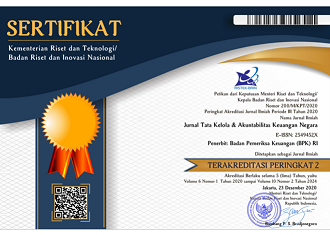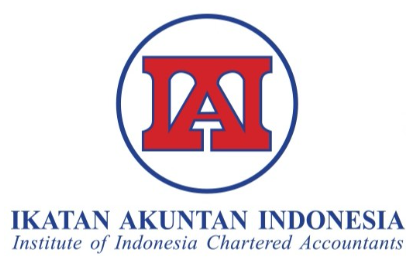An Overview of Competency Development Through Formal Education and Professional Certification Program to Increase the Capacity of BPK
DOI:
https://doi.org/10.28986/jtaken.v8i2.1118Keywords:
Competency development, BPK capacity, professional certification program, formal educationAbstract
The Audit Board of the Republic of Indonesia plays an essential role in ensuring accountability and responsibility for state finance audits. Therefore, auditors must always maintain their competence through continuous professional development. This study describes the competency development program focusing on formal degree education and professional certification for BPK employees. Furthermore, this study measures the adequateness of such a program compared to the allocation in competency development planning, as well as advantages and challenges according to employee perceptions. This study uses secondary data from the 2016-2020 Competency Development Activity Report, the 2019 BPK Peer Review Report, and a questionnaire study. The result shows that BPK has actualized competency development through formal degree education and professional certification program. However, the actualization of competency development with professional certification in 2016-2020 has not yet fully met the allocation stipulated in BPK's Human Capital Development Plan. Employees' perception shows high interest in competency development through formal degree education programs and professional certifications. However, these interests are met with several challenges. One of the challenges that arise involves career advancement and inclusiveness of competency development for all employees, including non-auditor and non-accounting employees. This study suggested further research on conducting a more comprehensive evaluation to ensure that implementing competency development contributes to BPK's capacity.
References
Atmojo, M. E., Khaerah, N., & Mutiarin, D. (2016). The Development of state civil apparatus. Advances in Social Science, Education and Humanities Research, 84. Proceeding International Conference on Ethics in Governance (ICONEG 2016). DOI: 10.2991/iconeg-16.2017.66
Boyatzis, R. E. (2007). Developing emotional intelligence competencies. In J. Ciarrochi & J. D. Mayer (Eds.), Applying emotional intelligence: A practitioner's guide (pp. 28–52). Psychology Press.
Boyatzis, R. E. (2008). Competencies in the 21st Century. Journal of Management Development, 27(1), 5-12. DOI: 10.1108/02621710810840730
Boyatzis, R. E. (2009). Competencies as a behavioral approach to emotional intelligence. Journal of Management Development, 28(9), 749-770. DOI: 10.1108/02621710910987647
Boyatzis, R. E. (2011). Managerial and leadership competencies: A behavioral approach to emotional, social and cognitive intelligence. Vision: The Journal of Business Perspective, 15(2). DOI: 10.1177/097226291101500202
BPK RI. (2008). Decree of the Secretary-General of BPK RI Number 323/K/X-XIII.2 /12/2008 concerning Procedures for Organizing Scholarships in the BPK (Keputusan Sekretaris Jenderal BPK RI Nomor 323/K/X-XIII.2 /12/2008 tentang Tata Cara Penyelenggaraan Beasiswa di BPK). Jakarta: BPK RI.
BPK RI. (2015). BPK Regulation Number 7 Year 2015 concerning BPK's Strategic Plan for 2016-2020 (Peraturan BPK RI Nomor 7 Tahun 2015 tentang Rencana Strategis BPK Tahun 2016-2020). Retrieved from https://peraturan.bpk.go.id/Home/Details/150481/peraturan-bpk-no-7-tahun-2015
BPK RI. (2016). Decree of the Secretary-General of BPK No.349/K/X-XIII.2/8/2016 concerning BPK's HCDP for the period of 2016-2020 (Keputusan Sekretaris Jenderal BPK RI Nomor 349/K/X-XIII.2 /8/2016 tentang HCDP periode 2016-2020). Jakarta: BPK RI.
BPK RI. (2017). BPK Regulation Number 1 Year 2017 concerning State Financial Audit Standards (Peraturan BPK RI Nomor 1 Tahun 2017 tentang Standar Pemeriksaan Keuangan Negara). Retrieved from https://www.bpk.go.id/ page/standar-pemeriksaan-keuangan –negara
BPK RI. (2020). The Competency Development Activity Report 2016-2020. Jakarta: BPK RI.
Denhardt, R. B., & Denhardt, J. V. (2003). The new public service: An approach to reform. International Review of Public Administration, 8(1), 3-10. DOI: 10.1080/12294659.2003.10805013
Ellström, P., & Kock, H. (2008). Competence development in the workplace: Concepts, strategies, and effects. Asia Pacific Education Review, 9, 5-20. DOI: 10.1007/BF03025821
Fuentes, L. H. F. (2016). Foundations for public administration science in the 21st century. Mexico: INAP. Retrieved from https://issuu.com/senadorlibro/docs/senador
Government Regulation Number 11 of 2017 concerning Management of Civil Apparatus (Peraturan Pemerintah Nomor 11 Tahun 2017 tentang Manajemen Pegawai Negeri Sipil). Retrieved from https://peraturan.bpk.go.id/Home/Details/5831/pp-no-11-tahun-2017
Indriasih, D. (2014). The effect of government apparatus competence and the effectiveness of government internal control toward the quality of financial reporting in local government. Research Journal of Finance and Accounting, 5(20), 38-47.
INTOSAI. (2016). Supreme Audit Institutions Performance Measurement Framework. Retrieved from https://www.idi.no/elibrary/well-governed-sais/sai-pmf/426-sai-pmf-2016-english/file
INTOSAI. (2019). ISSAI 140: Quality Control for SAIs. Retrieved from https://www.intosai.org/fileadmin/downloads/documents/open_access/ISSAI_100_to_400/issai_140/ISSAI_140_en.pdf
Komara, E. (2019). Kompetensi profesional pegawai ASN (Aparatur Sipil Negara) di Indonesia. Mimbar Pendidikan, 4(1), 73-84. DOI:10.17509/mimbardik.v4i1.16971
Koswara, K., & Rasto, R. (2016). Kompetensi dan kinerja guru berdasarkan sertifikasi profesi. Jurnal Pendidikan Manajemen Perkantoran, 1(1), 61-71. DOI: 10.17509/jpm.v1i1.3269
Kozyryeva, O. V., & Demchenko, N. V. (2017). Professional competence of government employees as a condition for public authorities' effectiveness. International Journal of Innovative Technologies in Economy, 4(10), 39-43.
Laakso-Manninen, R., & Viitala, R. (2007). Competence management and human resource development: A theoretical framework for understanding the practices of modern Finnish organizations. Retrieved from https://core.ac.uk/download/pdf/38126714.pdf.
Lacy, P., Arnott, J., & Lowitt, E. (2009). The challenge of integrating sustainability into talent and organization strategies: investing in the knowledge, skills, and attitudes to achieve high performance. Corporate Governance, 9(4), 484-494. DOI: 10.1108/14720700910985025
Prasodjo, E. (2014). Undang-Undang Aparatur Sipil Negara: Membangun profesionalisme Aparatur Sipil Negara. Jurnal Kebijakan dan Manajemen PNS, 8(1), 13-29.
Raharja, W. T., Suaedi, F., & Windijarto. (2017). Competencies in public services (case study: Budget management in Blimbing Village, District of Gudo, Jombang Regency, Indonesia). Developing Country Studies, 7(1), 56-61.
Said, L. L., & Munandar, A. (2018). The influence of auditor’s professional skepticism and competence on fraud detection: The role of time budget pressure. Jurnal Akuntansi dan Keuangan Indonesia, 15(1). DOI: 10.21002/jaki.2018.06
Seal, C. R., Boyatzis, R. E., & Bailey, J. R. (2012). Fostering emotional and social intelligence in organizations. Organization Management Journal, 3(3), 190-209. DOI: 10.1057/omj.2006.19
Sharma, R. R. (2008). Emotional intelligence from 17th century to 21st century: Perspectives and directions for future research. SAGE Journals, 12(1). DOI: 10.1177/097226290801200108.
Supreme Audit Office of Poland, Norway, Estonia. (2019). Peer Review Report on the Audit Board of the Republic of Indonesia. Jakarta: Supreme Audit Office of Poland, Norway, Estonia.
United Nations. (2010). UN Competency Development – A Practical Guide. Retrieved from https://hr.un.org/sites/hr.un.org/files/UN-Competency-Development-A-practical-guide_0_1.pdf.
Wahjusaputri, S., & Fitriani, S. (2017). Competency development of civil state apparatus in terms of human resource management. Advances in Social Science, Education and Humanities Research, 164. DOI: 10.2991/icli-17.2018.6.
Downloads
Submitted
Accepted
Published
How to Cite
Issue
Section
License

Jurnal Tata Kelola dan Akuntabilitas Keuangan Negara is licensed under
a Creative Commons Attribution-ShareAlike 4.0 International License




















